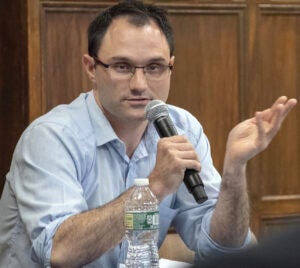Gabór M. Tóth Awarded 2023 Richard Deswarte Prize in Digital History

Gabór M. Tóth, the 2018-2019 Center Postdoctoral Research Fellowship at the USC Dornsife Center for Advanced Genocide Research and currently a postdoctoral researcher at the Luxembourg Center for Contemporary Digital History (C2DH) at the University of Luxembourg, has been awarded the 2023 Richard Deswarte Prize in Digital History. Tóth shares this award with Tim Hempep, Krisha Somandepalli, and Shri Narayanan for their article “Studying Large-Scale Behavioural Differences in Auschwitz-Birkenau with Simulation of Gendered Narratives” (Digital Humanities Quarterly 16:3, 2022). The Richard Deswarte Prize in Digital History is awarded annually by the Digital History Seminar of the Institute of Historical Research, School of Advanced Studies, University of London, to a digital humanities history project and aims to celebrate the best of digital history internationally.
In their article, Tóth, Hempep, Somandepalli, and Narayanan utilized a computational approach to study 6,628 interviews by survivors of the Auschwitz-Birkenau concentration camp and killing site. The authors set out to investigate the behavioral differences between men and women imprisoned in Auschwitz-Birkenau. They found that women were more likely to recall acts of solidarity in their oral testimonies and more likely to perform acts of solidarity and build social bonds inside the camp. Their work intersects history with physics and computer science, advancing the field of Holocaust studies by presenting the possibilities for collaboration between fields. The article is based on research that Tóth conducted while in residence at the Center and the Signal Analysis and Interpretation Laboratory (SAIL) at the USC Viterbi School of Engineering led by Professor Shrikanth Narayanan, one of the co-authors of the article.
On Tuesday October 24, 2023, Tóth presented the findings of this paper during the Deswarte Prize Seminar at the Institute of Historical Research, University of London, United Kingdom. Watch that lecture here.
Read “Studying Large-Scale Behavioural Differences in Auschwitz-Birkenau with Simulation of Gendered Narratives” (Digital Humanities Quarterly 16:3, 2022) here.
Read the Institute of Historical Research’s award announcement here.
Tóth has been considering the ways in which the digital humanities can use oral history testimonies to advance knowledge about the Holocaust for several years. The year before his Center fellowship, he was a postdoctoral fellow at the Yale University Digital Humanities Lab and the Fortunoff Video Archive for Holocaust Testimonies. There he began developing a searchable digital anthology of survivor testimonies entitled Let Them Speak / In Search of the Drowned: Testimonies and Testimonial Fragments of the Holocaust (LTS). This tool allows researchers to study around 3,000 transcripts of interviews with Holocaust survivors housed at three institutions that supported the project: Fortunoff Video Archive for Holocaust Testimonies at Yale University, United States Holocaust Memorial Museum, and USC Shoah Foundation’s Visual History Archive.
In a lecture he gave at USC in April 2019, Tóth described how examining survivor experiences through this innovative searchable tool opens a window to understanding the experiences of those who did not survive. Watch the lecture here.
Read a summary of the lecture here.
Read about the release of Let Them Speak here.
Tóth and Stephen Naron, Director of the Fortunoff Video Archive for Holocaust Testimonies at Yale University, co-authored a chapter focusing on the technical, curatorial, and ethical challenges raised by the anthology. It was published in the edited collection Mass Violence and Memory in the Digital Age: Memorialization Unmoored (Palgrave Macmillan, 2020).
Read more about that chapter here.
Read more about Gabór M. Tóth here.